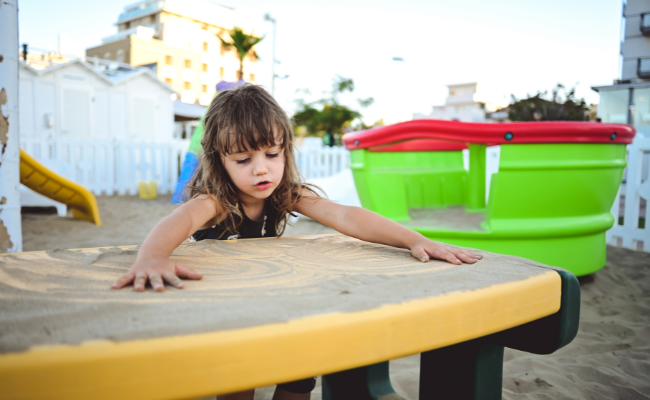While many children greatly enjoy the thrills summer brings, for others, summertime presents a more uncertain time. Summer should be a blast for children.
This is the time of year when kids enjoy the sunny weather and exploration of the outdoors. Although this brings great joy to many children, it also brings new sensations such as the sand, suntan lotion, bare-feet, and splashing water. Kids with sensory processing concerns often struggle with these less familiar sensory experiences. For these children, the joys of summertime can easily turn into days filled with unease and discomfort.
It can be very frustrating as a parent to bring your family to a place such as the beach where a good time is assumed, only to watch your child melt down when faced with new sensory experiences. But there are many things adults can do to help children cope with unfamiliar or unwanted summer sensations:
- Anticipate the day’s sensory diet. Look ahead and consider the sensory experiences of the day, including any unfamiliar sights, loud noises, new smells, crowded lines, etc. Talk to your child about what their sensory day might look like. Sensory experiences often becomes less stressful and anxiety provoking when they are predictable.
- Give your child as much control as possible. Although it is not always possible to give options, when it is appropriate it can be very helpful to give your child some control of things like clothes, shoes, snacks, etc. Pick your battles and give your child as much choice as possible.
- Consider unscented products. The scents in suntan lotions and bug sprays can be disturbing and difficult for many children to ignore.
- Pair familiar objects with unfamiliar experiences. Encouraging children to bring something familiar, such as a fidget toy, a favorite stuffed animal, or even an old towel, to a new experience can greatly help with their coping and self regulation skills.
- Allow for frequent breaks. Your child might need occasional retreats to a quiet corner or a few minutes throughout the day to detach from activity. These breaks could include eating a snack or listening to favorite music. Breaks help us all re-group and prepare for the next round of activity.
- Plan your visits during less busy and crowded times. Fewer crowds often result in a quieter sensory environment with shorter wait times and minimal jostling in lines.
- Stay hydrated. This is an important reminder for all people during the summer. Dehydration could lead to irritability and less tolerance in a stimulating setting.
Hopefully with a little support and advanced planning, everyone can have a summer filled with fun and adventure
Author: Stacy Kramer, MS, OTR

